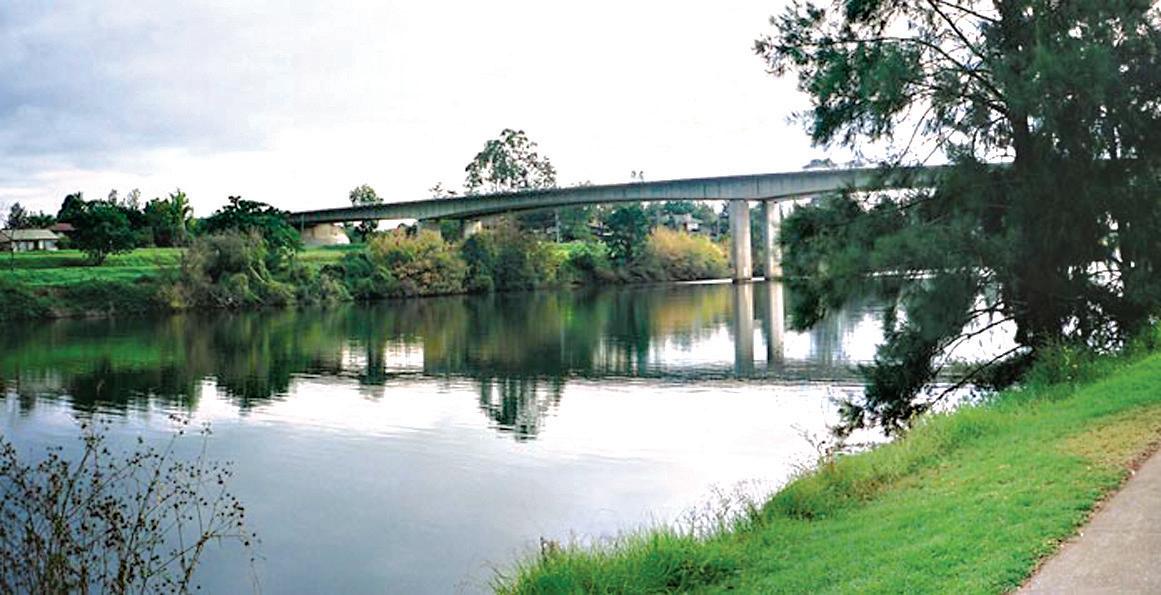
8 minute read
Reminiscences of Regentville
from 2010-06 Sydney (2)
by Indian Link

A holiday to the back of beyond has its share of charming childhood memories
BY GRAHAM SIMS
In our modern, frenetic world of endless technological and social change, “yesterday” seems a long time ago, and anything earlier than yesterday seems so long ago, as to be totally irrelevant. And as our population grows older, the world seems more and more the exclusive province of the young. It is, in many ways, a sad time to be old. This phenomenon is no longer restricted to what used to be labelled “the Western World”. Developing countries such as India, Indonesia, Malaysia, China and even Africa are experiencing similar breakdowns in their traditional respect for, or even awareness of their own history. The world is as it is, not as it was
I was recently talking to a group of intelligent, reasonably well educated young people whom I’d encountered while I was cycling at Bicentennial Park at Homebush Bay. They were gobsmacked when I told them that this was my boyhood playground in the 1950s, with its “mangrove swamp”, the Homebush Abattoirs, the bull-sharks we used to shoot, along with the pigs escaped from Barnes Bacon factory, our escapades in the brick pits etc., etc.
They could barely believe that someone still alive and breathing, (and able to ride a bike) could remember and have lived in a Sydney so different from the one they knew.
One of them then mentioned that she had lived at Regentville... which I’d probably never heard of.
My credibility, (and, no doubt, my antiquity), then rose spectacularly, when I told them that my German, (maternal) grandmother lived alone at Regentville, about three miles west of Penrith, just off Mulgoa Road, for 30 years, until not long before her death in 1956, aged 86. With my grandfather, Andrew, she had had eight children, including the youngest, my mother.
My uncles helped themselves to spare “convict bricks” from an old mill, wheeling them in wheelbarrows about a mile to my grandmother’s block
Their marriage had ultimately failed and, after living in various country towns with the two or three youngest children, my grandmother, for some reason, bought a block of rural land at Regentville (for the equivalent of $1.50 an acre!). She must have first moved there in about 1930, and it’s still a family mystery as to why she chose Regentville. It was then regarded as “the back of beyond” and my grandmother, in her German accent, once described the area as “the last place on earth the Good Lord made ... and He forgot to finish it!”
When my grandmother first moved to Regentville there was neither electricity nor running water. These did not come until many years later and, stubborn old cuss, she was most reluctant to avail herself of either.
Even more amazingly, for the first two years she lived there in a tent. Whether this was because of her pigheadedness or lack of money I’ve never really been certain, but I know she would sit outside her tent of an evening, with a hurricane lamp beside her and a shotgun across her knees, waiting to scare off the wild bulls that used to roam across the unfenced paddocks, looking for trouble.
I remember my grandmother as indomitable, and just about fearless. (A large, black snake lived beneath her water tank, and we grandkids were under threat of violence if we dared disturb it. “It kills the rats and mice”.)
After these few years of lonely tent-dwelling, and,
I’m sure, persuaded by some of her children, who were living “normal” lives elsewhere, my grandmother allowed a small house to be built for her, mainly by two of my uncles. At least some of my grandmother’s children were concerned about her living alone in a tent, “so far from Sydney”, and so far away from where most of them now lived.
With money so scarce, “scrounging” was the name of the game. My uncles helped themselves to spare “convict bricks” from an old mill, wheeling them in wheelbarrows about a mile to my grandmother’s block.
By various means, sheets of corrugated iron, timber, cement and assorted building materials were also “scrounged” and gradually a little cottage, complete with alligator chimney, bay windows and the inevitable outdoor “dunny” emerged.
I remember my grandmother’s little cottage as looking (and feeling) just like something from our pioneering days of the 19th, or even the 18th century. It had a very simple structure, with a verandah front and back, a “primitive” kitchen with a stone floor and a fuel stove (which never “went out”), a combined laundry and “wash room” (never called a bathroom), a living room (called the parlour), a tiny bedroom (where, later, we stayed) and my grandmother’s bedroom (into which we rarely dared to venture). My parents’ modest house seemed luxurious by comparison.
Nevertheless, staying in my grandmother’s quaint, simple little house, and the adventure of actually getting there, form part of my childhood memories which will never fade.
55 years ago the geographic centre of Sydney was about Strathfield; Parramatta was in the “outer west”; electric trains went only as far as Blacktown, where we had to change trains and catch one of the only two or three steam trains which went to Penrith each day. Most of these continued to the Blue Mountains.
On eventually reaching Penrith, the wooden platforms were shorter than an eight carriage train, so, unless we fluked the section of the platform beside our carriage, we had to climb down onto the tracks and walk along until we could climb back up onto the platform. Of course, us children I thought this great fun; our harassed mother, struggling with us and our luggage and toys, must have found it less hilarious.
My grandmother’s house in Regentville was then a decidedly undeveloped rural area, with only limited residential developments beyond Regentville itself. My father, uncle and I went rabbit-shooting in the vast paddocks behind what is now Regentville Public School, and that the suburb now called Glenmore Park was open grazing land, full of rabbits, foxes and the occasional wild bull.
Having finally arrived at Penrith station, we faced four possible scenarios.
The rare one was that my grandmother would have driven the three miles into Penrith in her horse and buggy (or, later, sulky), to pick us up.
Or our train, more by good luck than good management, had coincided with one of the two buses per day which went out along Mulgoa Road.
Sometimes my mother, either through a financial windfall or exhaustion, or both, decided we could “splurge” on a taxi out to Regentville. Oh luxury, rare indeed!
Or finally, we would have to carry and/or drag our luggage, toys etc., walking the three miles along Mulgoa Road to Regentville.
Needless to say the walk was our most common means of making the journey. I can still hear my mother saying, “Well, kids, we’ll just have to go on shank’s pony”, (i.e. on foot!)
When we eventually arrived, our welcome was usually underwhelming. Although my mother was incredibly loyal to my grandmother, we never got the impression that “grandma” was pleased to see us ... or anybody, for that matter.
We were tolerated, rather that welcomed, with the inevitable admonitions of “There’s not much water in the tanks” or “Don’t you children get under my feet!”
My mother, if lucky, would be greeted with “Well, girlie, now you’re here, I suppose you’d better put the kettle on.”
Accustomed to such an effusive welcome, we three kids would “go outside and play”, in an environment so simple and different from our own in suburban Concord. There was a buggy shed, complete with buggy and sulky (four and two wheelers, respectively); sheds containing old farm implements, harnesses, milk churns, tins, jars etc. etc., which we never tired of investigating and playing with, although forbidden by grandmother to do so.
Most days we’d go out into the surrounding paddocks with a homemade billycart, to collect firewood ... always watching out for a belligerent bull or black snake.
When evening came, we’d have “supper” by the light of a mysteriously ornate kerosene lamp which hung down from the rafters, and by about 8pm we’d be asleep, engulfed in white, gossamer mosquito netting, which always trapped one or two “mozzies” inside, while rarely allowing a breath of fresh air to enter.
Although this little world, along with much else, has changed forever, my grandmother’s cottage, “modernised” but still recognisable, still stands, obviously well cared for by the man who now owns it, no doubt unaware of its history and its significance to me.
Having now told this tale, I must honour a pledge I made some years ago, to show this man some photos of the little house in its early days, so long ago.
Who knows, he may even like to read this story.
Laugh out loud
Life Saver
By Julian Moshegov
A goalkeeper was walking along the street one day when he heard screams from a nearby building. He looked up to see smoke billowing from the top and a woman leaning out holding a baby. “Help! Help!” screamed the woman, “I need someone to catch my baby!”
A crowd of onlookers had gathered, but none was confident about catching a baby dropped from such a great height. Then the goalkeeper stepped forward. “I’m a professional goalkeeper,” he called to the woman. “I’m renowned for my safe hands. Drop the baby and I will catch it. For me, it will be just like catching a ball.”
The woman agreed. “Ok, then. When I drop my baby, treat it as if you were catching a ball.” On a count of three, the woman dropped the baby. Everyone held their breath as the goalkeeper lined himself up to catch it. There was a huge sigh of relief, followed by wild cheering as the goalkeeper caught the baby safely in his arms. Then he bounced it twice on the ground and kicked it 50 yards down the street.
Famous football quotes
Some people think football is a matter of life and death. I assure you, it’s much more serious than that.
Bill Shankly, Scottish football player
The rules of soccer are very simple. Basically it is this: if it moves, kick it. If it doesn’t move, kick it until it does.
Phil Woosnam, Welsh football player
Did you know...
The first FIFA World Cup was held in 1930.
The FIFA World Cup Trophy is made of real gold and weighs 6.2 kgs. It was made in 1970 by an Italian designer. Winners have to return it at every tournament, but they get a gold-plated replica to keep.

Before 1970, there used to be another
Foto Corner
trophy, but it was stolen. It has never been found – it is believed the thieves melted it down for its gold.
FIFA also organises the FIFA Futsal World Championship and the FIFA Beach Soccer World Cup.
The average age of the FIFA 2010 players is 27 years.
I learnt a new word
Clean Sheet: When a goalkeeper doesn’t concede a single goal Manan
Dead Ball: When the ball is ‘dead’ it is temporarily not playable, and neither team may attempt to advance it and or take possession. Devna






Vuvuzela
The goalkeeper is the jewel in the crown and getting at him should be almost impossible. It’s the biggest sin in football to make him do any work.
George Graham, Scottish football player

Whoever invented football should be worshipped as a God.






Hugo Sanchez, Mexican soccer player and coach
The “vuvuzela” is a South African instrument with roots in traditional music. It means “vuvu-ing”, or, making the “vuvu” noise. It could also be related to the word “shower” because it showers the spectators with noise, or maybe simply because it looks like a showerhead



















